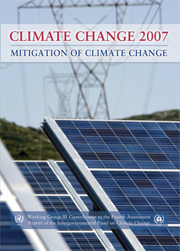 Climate Change 2007 - Mitigation of Climate Change
Climate Change 2007 - Mitigation of Climate Change Book contents
- Frontmatter
- Contents
- Foreword
- Preface
- Summary for Policymakers
- Technical Summary
- 1 Introduction
- 2 Framing issues
- 3 Issues related to mitigation in the long term context
- 4 Energy supply
- 5 Transport and its infrastructure
- 6 Residential and commercial buildings
- 7 Industry
- 8 Agriculture
- 9 Forestry
- 10 Waste management
- 11 Mitigation from a cross sectoral perspective
- 12 Sustainable Development and mitigation
- 13 Policies, instruments and co-operative agreements
- Annex I Glossary
- Annex II Acronyms, abbreviations and chemical compounds
- Annex III List of contributors
- Annex IV List of reviewers
- Index
Summary for Policymakers
- Frontmatter
- Contents
- Foreword
- Preface
- Summary for Policymakers
- Technical Summary
- 1 Introduction
- 2 Framing issues
- 3 Issues related to mitigation in the long term context
- 4 Energy supply
- 5 Transport and its infrastructure
- 6 Residential and commercial buildings
- 7 Industry
- 8 Agriculture
- 9 Forestry
- 10 Waste management
- 11 Mitigation from a cross sectoral perspective
- 12 Sustainable Development and mitigation
- 13 Policies, instruments and co-operative agreements
- Annex I Glossary
- Annex II Acronyms, abbreviations and chemical compounds
- Annex III List of contributors
- Annex IV List of reviewers
- Index
Summary
Introduction
1. The Working Group III contribution to the IPCC Fourth Assessment Report (AR4) focuses on new literature on the scientific, technological, environmental, economic and social aspects of mitigation of climate change, published since the IPCC Third Assessment Report (TAR) and the Special Reports on CO2 Capture and Storage (SRCCS) and on Safeguarding the Ozone Layer and the Global Climate System (SROC).
The following summary is organised into six sections after this introduction:
Greenhouse gas (GHG) emission trends
Mitigation in the short and medium term, across different economic sectors (until 2030)
Mitigation in the long-term (beyond 2030)
Policies, measures and instruments to mitigate climate change
Sustainable development and climate change mitigation
Gaps in knowledge.
References to the corresponding chapter sections are indicated at each paragraph in square brackets. An explanation of terms, acronyms and chemical symbols used in this SPM can be found in the glossary to the main report.
Greenhouse gas emission trends
2. Global greenhouse gas (GHG) emissions have grown since pre-industrial times, with an increase of 70% between 1970 and 2004(high agreement, much evidence).
Since pre-industrial times, increasing emissions of GHGs due to human activities have led to a marked increase in atmospheric GHG concentrations [1.3; Working Group I SPM].
[…]
- Type
- Chapter
- Information
- Climate Change 2007 - Mitigation of Climate ChangeWorking Group III contribution to the Fourth Assessment Report of the IPCC, pp. 1 - 24Publisher: Cambridge University PressPrint publication year: 2007
- 353
- Cited by


